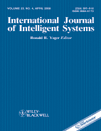
INTERNATIONAL JOURNAL OF INTELLIGENT SYSTEMS
Scope & Guideline
Unveiling the Future of Human-Computer Interaction
Introduction
Aims and Scopes
- Artificial Intelligence and Machine Learning:
The journal extensively covers advancements in AI and machine learning techniques, focusing on their application in diverse fields such as healthcare, finance, and industrial systems. - Decision-Making Systems:
Research on intelligent decision-making frameworks, including multi-criteria decision-making (MCDM) methods, fuzzy logic systems, and optimization techniques is a significant focus area. - Data Fusion and Knowledge Representation:
The integration of data from multiple sources to improve decision-making and system performance is emphasized, including the use of knowledge graphs and data mining techniques. - Control Systems and Robotics:
The journal publishes research on intelligent control systems, robotics, and automation, particularly those that incorporate adaptive and learning-based approaches. - Computer Vision and Image Processing:
Significant contributions in the area of computer vision, including image analysis, recognition, and processing techniques, particularly those utilizing deep learning. - Networked and Distributed Intelligent Systems:
Research on IoT, cloud computing, and edge computing, facilitating the development of intelligent systems that operate in networked environments. - Health Informatics and Biomedical Engineering:
The application of intelligent systems in healthcare, particularly for diagnostics, patient monitoring, and treatment optimization.
Trending and Emerging
- Deep Learning and Neural Networks:
There is a significant increase in publications focused on deep learning techniques, particularly convolutional neural networks (CNNs) and recurrent neural networks (RNNs), which are being applied across various domains, including image and speech recognition. - Explainable AI (XAI):
Research focusing on the interpretability and transparency of AI models is on the rise, addressing the need for systems that not only perform well but also provide understandable outputs. - Federated Learning and Privacy-Preserving Techniques:
Emerging interest in federated learning and privacy-preserving algorithms reflects the growing importance of data security and ethical considerations in AI research. - Intelligent Decision Support Systems:
There is a growing focus on developing sophisticated decision support systems that leverage AI for enhanced decision-making in complex environments. - Multimodal Learning:
Research combining multiple data modalities (e.g., text, images, and audio) is trending, as it offers more robust and comprehensive solutions to complex problems. - Applications in Smart Cities and IoT:
Emerging themes include the application of intelligent systems in smart city initiatives and IoT, focusing on automation, optimization, and sustainability in urban environments.
Declining or Waning
- Traditional Statistical Methods:
There is a noticeable reduction in the publication of research focused on conventional statistical techniques, indicating a shift towards more complex, machine learning-driven approaches. - Basic Rule-Based Systems:
Research on simplistic rule-based systems appears to be declining as more sophisticated AI methodologies, such as deep learning and reinforcement learning, gain precedence. - Generic Optimization Algorithms:
The frequency of papers centered on generic optimization algorithms without specific applications has decreased, with a trend toward more tailored optimization solutions for specific domains. - Static Knowledge Representation:
Static models of knowledge representation are less frequently explored, as dynamic and adaptive knowledge systems that evolve with data are becoming more prominent.
Similar Journals
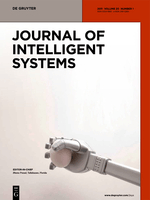
Journal of Intelligent Systems
Diving Deep into Intelligent Systems and SolutionsThe Journal of Intelligent Systems, published by DE GRUYTER POLAND SP Z O O, is a premier open access journal that has been at the forefront of advancements in the fields of Artificial Intelligence, Information Systems, and Software Engineering since its inception in 1991. With a commitment to disseminating high-quality research, the journal has been recognized in the 2023 category quartiles as Q3 in these critical areas, reflecting its relevance and impact in the academic community. The journal serves as a vital platform for researchers, professionals, and students interested in the evolving landscape of intelligent systems, offering insights into innovative methodologies and applications. As an open access publication since 2020, it ensures that research is readily available to a global audience, fostering collaboration and engagement within the scientific community. With a Scopus rank in the 65th to 69th percentiles across its categories, The Journal of Intelligent Systems continues to contribute significantly to the discourse on intelligent technologies and their implications for the future.
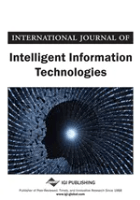
International Journal of Intelligent Information Technologies
Advancing the Future of Intelligent Decision-Making.Founded in 2005, the International Journal of Intelligent Information Technologies serves as a pivotal platform for the dissemination of cutting-edge research in the fields of decision sciences and information systems. Published by IGI Global, this journal is dedicated to advancing the understanding of intelligent systems, data analytics, and technological innovations that drive modern decision-making processes. With an ISSN of 1548-3657 and an E-ISSN of 1548-3665, the journal is indexed strategically to ensure visibility among academia and industry professionals. Although it currently holds a ranking in the Q4 quartile of both decision sciences and information systems categories in 2023, it stands out for its comprehensive investigations into best practices and emerging trends in intelligent information technologies. It aims to provide readers with rigorous, peer-reviewed articles that offer practical insights and theoretical frameworks to facilitate informed decision-making in an increasingly data-driven world. Its commitment to quality research makes it an invaluable resource for researchers, professionals, and students alike who are eager to explore new dimensions of technology-assisted decision-making.
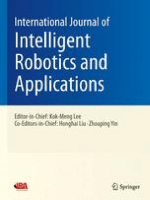
International Journal of Intelligent Robotics and Applications
Showcasing Cutting-Edge Developments in Intelligent RoboticsInternational Journal of Intelligent Robotics and Applications, published by SPRINGER SINGAPORE PTE LTD, is a pivotal platform dedicated to advancing the field of robotics and artificial intelligence. With an ISSN of 2366-5971 and an E-ISSN of 2366-598X, this journal has established its presence since its inception in 2017, showcasing innovative research and applications up until 2024. The journal aims to foster interdisciplinary collaboration by publishing high-quality articles that cover a broad range of topics from foundational AI concepts to cutting-edge robotics technologies. It holds respectable rankings, positioned in the Q3 category of Artificial Intelligence and Q2 category of Computer Science Applications in the 2023 metrics, and is indexed in Scopus with notable rankings in both computer science disciplines. Although it follows a subscription model, the journal remains committed to facilitating access to groundbreaking research for its audience of researchers, professionals, and students, contributing to the ever-evolving landscape of intelligent robotics.

AUTOMATIC CONTROL AND COMPUTER SCIENCES
Bridging Theory and Practice in Control and ComputingAUTOMATIC CONTROL AND COMPUTER SCIENCES is an esteemed academic journal dedicated to the exploration and advancement of automation, control systems, and computer science disciplines. Published by PLEIADES PUBLISHING INC, this journal serves a global audience from its base in the United States and provides a platform for high-quality research and innovative applications across its converged years, spanning from 1973 to 2024. As of 2023, it is categorized in Q3 in Control and Systems Engineering and Q4 in both Signal Processing and Software, reflecting its valuable contributions to these fields of study. Despite its modest rankings in Scopus, it demonstrates a commitment to disseminating knowledge and fostering scholarly dialogue among researchers and practitioners. Although not an open-access journal, AUTOMATIC CONTROL AND COMPUTER SCIENCES remains vital for academics seeking to deepen their understanding and expertise in control theories and computational methodologies.
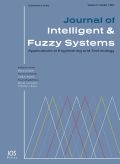
JOURNAL OF INTELLIGENT & FUZZY SYSTEMS
Advancing the Frontiers of AI and Fuzzy SystemsJOURNAL OF INTELLIGENT & FUZZY SYSTEMS is a premier publication dedicated to advancing the field of artificial intelligence, fuzzy systems, and related engineering disciplines. Published by IOS PRESS, this journal plays a vital role in disseminating innovative research and methodologies that push the boundaries of knowledge from its inception in 1993 through 2024. With an impact factor underscoring its significance, it maintains a strong reputation for quality and rigor, achieving Q3 in Artificial Intelligence and Q2 in Engineering (miscellaneous) as reported in 2023. Researchers can access invaluable insights into current trends and applications, making it an essential resource for professionals and scholars alike. The journal welcomes contributions that bridge theoretical advancements and practical implementations, fostering a community of interdisciplinary collaboration. Situated in the heart of the Netherlands, the JOURNAL OF INTELLIGENT & FUZZY SYSTEMS is committed to enhancing understanding in the realms of mathematics, statistics, and probability, with Scopus rankings reflecting its competitive edge across various fields.
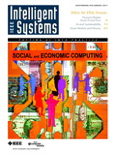
IEEE INTELLIGENT SYSTEMS
Unleashing Potential in Computer Networks and AIIEEE Intelligent Systems, published by the renowned IEEE Computer Society, stands at the forefront of research in the fields of Artificial Intelligence and Computer Networks and Communications. With an impressive Q1 ranking in both categories as of 2023 and Scopus rankings placing it in the top 5% of its field, this journal not only showcases cutting-edge scientific advancements but also serves as a vital resource for practitioners, academics, and students seeking to deepen their understanding and application of intelligent systems. The journal covers a broad range of topics including machine learning, data mining, and system architectures, reflecting its commitment to addressing contemporary challenges and innovations in technology. Although it does not offer open access, the journal's research contributions are invaluable, ensuring that its readership remains engaged with the latest findings and applications in a rapidly evolving field. For those interested in submitting high-quality research or staying updated on the latest developments, IEEE Intelligent Systems represents an essential hub of knowledge.
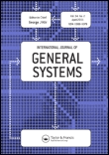
INTERNATIONAL JOURNAL OF GENERAL SYSTEMS
Pioneering Research in Systems Theory and ApplicationsThe INTERNATIONAL JOURNAL OF GENERAL SYSTEMS, published by TAYLOR & FRANCIS LTD, is a prestigious peer-reviewed journal dedicated to advancing the fields of systems theory and its applications across a variety of scientific disciplines. With an ISSN of 0308-1079 and an E-ISSN of 1563-5104, this journal has carved a niche since its inception in 1974, continuing to provide a platform for innovative research through to 2024. Featured in the esteemed Q2 category in multiple domains, including Computer Science Applications, Control and Systems Engineering, and Information Systems, it serves as a vital resource for the scientific community, fostering interdisciplinary collaboration. The journal's rankings in Scopus reflect its quality, with noteworthy positions in fields such as Mathematics, Engineering, and Theoretical Computer Science. While access is through subscription, the journal remains an essential conduit for researchers, professionals, and students eager to deepen their understanding of general systems and their complex interactions within various environments.
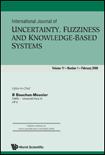
INTERNATIONAL JOURNAL OF UNCERTAINTY FUZZINESS AND KNOWLEDGE-BASED SYSTEMS
Exploring the intersection of fuzziness and artificial intelligence.Welcome to the INTERNATIONAL JOURNAL OF UNCERTAINTY FUZZINESS AND KNOWLEDGE-BASED SYSTEMS, a prestigious publication dedicated to advancing the fields of artificial intelligence, control systems engineering, information systems, and software research. Published by WORLD SCIENTIFIC PUBL CO PTE LTD in Singapore, this journal serves as a vital forum for the dissemination of innovative theories, methodologies, and applications rooted in the coexistence of uncertainty and fuzziness within knowledge-based systems. With its ISSN 0218-4885 and E-ISSN 1793-6411, the journal consistently ranks in the Q3 category across various Scopus categories, including Control and Systems Engineering and Information Systems, reflecting its influential position in the academic community. Researchers and practitioners alike will find valuable insights and the latest trends through its comprehensive articles, making this journal an essential resource for those seeking to navigate the complexities of this evolving field.

International Journal of Intelligent Computing and Cybernetics
Pioneering Interdisciplinary Insights in Computing and CyberneticsThe International Journal of Intelligent Computing and Cybernetics, published by EMERALD GROUP PUBLISHING LTD, serves as a pivotal platform for advancing the field of intelligent computing and cybernetics since its inception in 2008. With a strong focus on innovative research and interdisciplinary collaboration, this journal is positioned in the prestigious Q2 category of Computer Science, ranking at an impressive 42nd out of 232 in Scopus, reflecting an 82nd percentile performance. The journal provides a venue for scholars and practitioners to disseminate their findings on cutting-edge technologies and methodologies that bridge the realms of computing, artificial intelligence, and cybersecurity. Although currently not an open-access journal, it widely circulates valuable insights essential for driving forward academic discourse and practical applications in the rapidly evolving digital landscape. Researchers, professionals, and students are encouraged to engage with this journal to stay at the forefront of advancements in intelligent systems and cybernetic solutions.

Complex & Intelligent Systems
Transforming Complex Systems Through Collaborative IntelligenceComplex & Intelligent Systems, published by SPRINGER HEIDELBERG, stands at the forefront of multidisciplinary research, focusing on the convergence of Artificial Intelligence, Computational Mathematics, and Engineering. With its rigorous peer-review process and impressive recognition within the academic community, this journal proudly holds a Q1 ranking in its respective categories for 2023, including a remarkable rank of #7 in Computational Mathematics out of 189 journals. Since transitioning to Open Access in 2015, Complex & Intelligent Systems has fostered accessibility and visibility for groundbreaking research, allowing professionals, students, and scholars worldwide to engage with high-impact studies. Hosted in the vibrant academic landscape of Switzerland, it not only enriches the scientific dialogue but also encourages innovative approaches to complex system analyses and intelligent solutions. With an unwavering commitment to advancing knowledge in evolving fields, this journal invites contributions that push the boundaries of research and application.